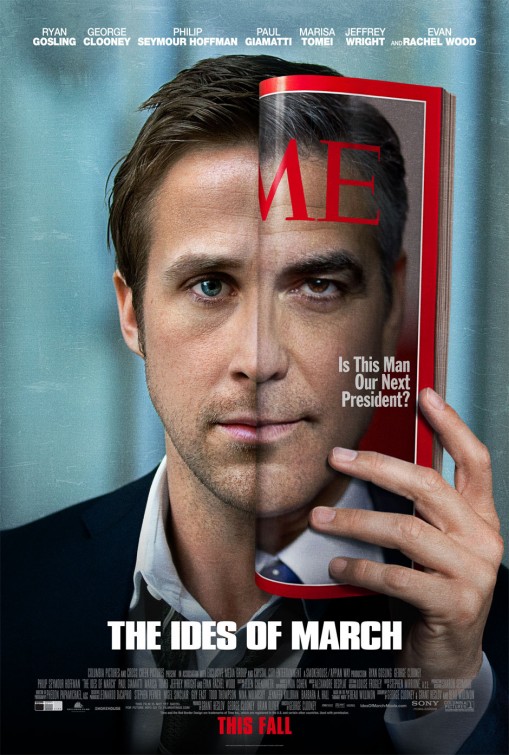Ambition Seduces, Power Corrupts
Director
George Clooney
Starring
Ryan Gosling
George Clooney
Evan Rachel Wood
Philip Seymour Hoffman
Paul Giamatti
The film opens in the deciding stages of the nomination for the US Democratic Party presidential candidate. The only two contenders left standing are a Senator from Arkansas (Senator Pullman) and Mike Morris [Clooney] of Pennsylvania. Within the first ten minutes it becomes quickly apparent that this film is less about the numbers, polling, speeches or wins and more about the back-room deals and driving force behind the two candidates. Morris’ campaign manager is run by the experienced but relatively paranoid Paul Zara [Hoffman] and his incredibly affable Junior Manager, Stephen Meyers [Gosling], leading the Pullman campaign is Tom Duffy [Giamatti], who is showing interest in Zara’s protégé. Everything starts well enough, Morris is a very idealistic individual with a very aggressive liberal policy but has enough support to make him a viable contender; furthermore we are led to believe that the Republican party haven’t got anyone who could openly oppose their candidate. On top of all this, Meyers genuinely believes in the man, the campaign and the cause; as with most young minds in politics, he genuinely believes getting his man in office is the right thing to do and the only way to bring about change. Having established all the players, Meyers receives a phone call from Duffy asking for a meeting to exchange important information. Against his better judgement, Meyers agrees to the meet, in which he is offered a job – to prove the offer is legitimate, Duffy reveals a strategy that will be hitting the newspapers the following day, a move which will completely wipe out Morris’ chance of staying on the ballot. As the ‘sure things’ chances diminish, Meyers becomes more and more pressed on whether or not he can do the right thing. At the same time, he has formed a secretive relationship with one of the interns (Molly, as played by Evan Rachel Wood), which exposes him to a disillusioning truth concerning Mike Morris. As everything comes to a head, Meyers’ integrity and loyalties are tested.
Despite how this film has been advertised or how it may appear, the main drive is less about the corruption of politics and more about whether a good man can retain a sense of righteousness or if the constant barrage of underhandedness will cause an eventual break. Granted, the film heavily deals with the tug-of-war between the idealistic and realistic natures of those in politics but it’s passionate without descending into a policy lecture and emotionally engaging without being overwhelming or heavy-handed. Much like The Social Network, which was branded as ‘the Facebook movie’, The Ides Of March needn’t have been about a political race, as the central focus is on the cynicism and under-handed tactics used by individuals seeking power or progression and its ability to crush (some would say naïve) dreams of integrity. The only reason any of the above actually works is down to the all-round stellar performances. Similar to one of Clooney’s previous directorial projects, Good Night, And Good Luck, he has assembled several brilliant and extremely talented individuals for both lead and supporting roles, which means even characters who may be on screen for only a handful of scenes are completely memorable, due to the casting decisions made. Taking the helm, Gosling’s transition from idealistic aide to jaded schemer is exceptional, bouncing back-and-forth between righteous passion, disgruntled vengeance and forlorn regret. Clooney also plays an interesting supporting role with less screen time than you might have thought; additionally, despite the ideological speeches his character is revealed to be a bit of a swine. But that’s the beauty of the entire piece, almost no one is clear-cut good or bad, there are no heroes or villains, just people.
As well as artistically speaking, the film works extremely well from a technical standpoint. Over the last few films (possibly excluding Leatherheads) Clooney has proved that he has a distinct eye for cinema and knows how to decently arrange and pace a commanding theatrical thriller. If anything seems out of place it’s the random passage of time sequences which are laced with Alexandre Desplat’s pleasing but often muddled score. It’s not that the incidental music is bad, it simply feels a little out of place at times, ranging from triumphant strings to patriotic brass but when it works, it works brilliantly – case in point, the final scene is accompanied by a beautifully unsure, tense and haunting piece that really ends the movie beautifully.
**Spoilers layered throughout this paragraph**
Now, I’d desperately love to award this film an eight out of ten but despite thoroughly enjoying the story, I had one key complaint: Evan Rachel Wood’s character was an utter waste. Ms. Wood played the role as well as possible but falls victim to the ‘woman in the refrigerator’ plot device. If you’re not familiar with this term, it’s a phrase coined in the comic industry as a reaction to the only way to seemingly instil an emotional response from a male character is to kill his girlfriend; thus implying that women’s roles in the medium are solely supportive to the males and are highly disposable. As the tension built in the story (I’m just going to assume you’ve seen the movie and speak candidly), you start to wonder whether Meyers will actually betray this young woman, just to destroy the campaign out of spite. But before he can actually make a decision (one he will have to live with for the rest of his life), it’s already made for him. Subsequently, he’s being played but it completely cheapens Molly’s plight and eventual death.
Something worth noting, this isn’t The West Wing. I realise that may sound ridiculous but The West Wing is a phenomenal television series which happened to cover the election campaign a fair few times and did it without sinking too heavily into American political jargon – well it did, all the time actually but it explained it clearly. I’m not saying I’m not interested in this film because it’s about US politics or because it didn’t explain US politics to me but I feel it will hurt the film’s international standing. Finally, this is an adaptation of a play and not all adaptations are well-received because of their pacing and focus on specific exchanges. I personally love adaptations of theatrical work and hold them in high regard because it challenges actors, forces the story to really focus on powerful and meaningful conversations and ensures the story is plot driven rather than a gimmicky mess. Unfortunately, as far as the industry is concerned, it doesn’t follow what is considered the standard contemporary routine and may be perceived as slow, boring or lacking in climax. I don’t necessarily think this is the case but I feel the film will suffer because of it. Overall, I found The Ides Of March to be a highly commendable character study, decently directed and extremely well acted but whether it finds an audience and sufficient accolades or not will remain to be seen.
Release Date:
28th October 2011
The Scene To Look Out For:
As this is based on a play, there are a handful of key interactions that play out extremely well but surprisingly enough, it’s usually the moments where the camera lingers on a calm stillness that captivates the audience the most. Specifically, Morris calls Zara into his car for a brief word and without ever hearing the exchange, the camera slowly zooms in on the stationary car. We all know what’s going on in the vehicle but we don’t need the details. Another example takes place after Meyers leaves Molly’s hotel, simply sitting in the car, the windscreen wiper intermittently activating. All of these quiet moments culminate in the final scene which simply presents the silent analysis and inner-thoughts of the lead character.
Notable Characters:
Naturally, Gosling does an exceptional job here but as a massive Giamatti fan, who relishes any opportunity to watch him act in literally anything, I can’t help but commend him. As with most of the supporting elements, Giamatti’s character is only given a handful of scenes to deal with but the calculative nature, bitter cynicism and more importantly, almost self deprecatory torment at work in Tom Duffy is enthralling stuff.
Highlighted Quote:
“I’ll do or say anything if I believe in it.. but I have to believe in the cause”
In A Few Words:
“Beautiful illustrative look into the moral obstacles and back-room deals of political campaigns”
Total Score: 3/5
![The Red Right Hand Movie Reviews [Matthew Stogdon]](https://reviews.theredrighthand.co.uk/wp-content/uploads/2021/12/cropped-header1.png)




